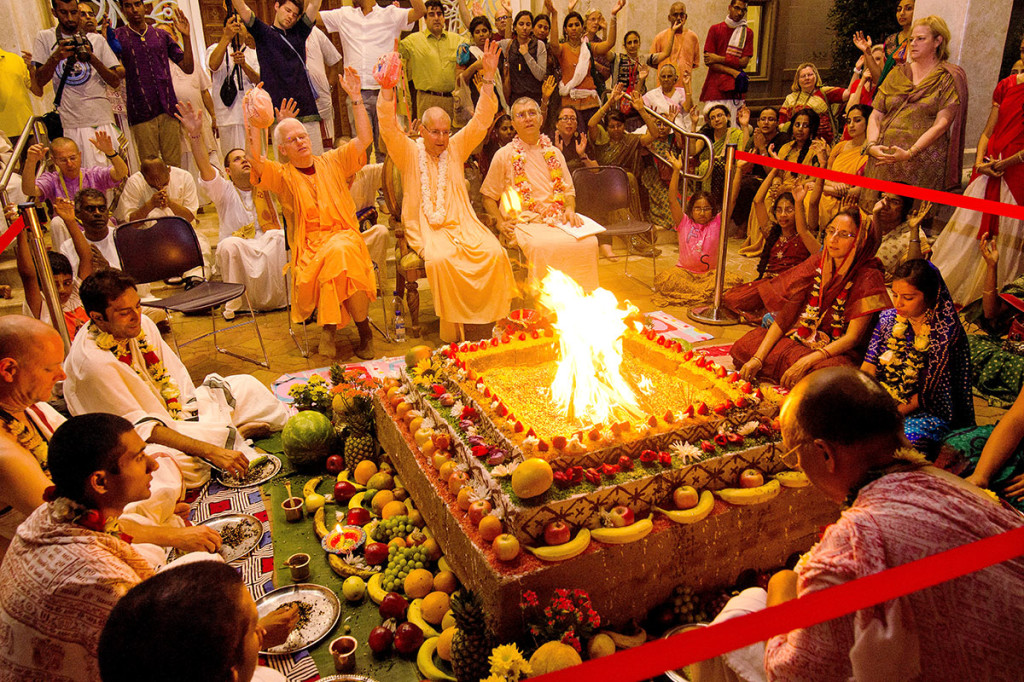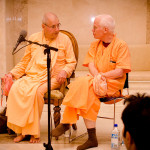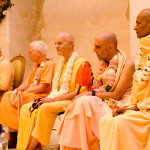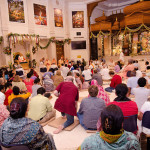Prabhupada Letters :: Anthology 2014-05-23 12:21:00 →
Prabhupada Letters :: 1970
Websites from the ISKCON Universe
 Small Serbian congregation reacted well and successfully started Food for Life prasadam distribution even though there is no legal ISKCON nor FFL. First day of distribution 4 devotees managed by the help of patriotic society "Serb for Serbs" to enter deep into flooded are where no media or civilians are allowed (besides those who are living there) Read more ›
Small Serbian congregation reacted well and successfully started Food for Life prasadam distribution even though there is no legal ISKCON nor FFL. First day of distribution 4 devotees managed by the help of patriotic society "Serb for Serbs" to enter deep into flooded are where no media or civilians are allowed (besides those who are living there) Read more › Conversation.
The post By hearing Krsna’s pastimes one attains faith, attachment and ultimately love appeared first on SivaramaSwami.com.
 At New Vraja-dhama, Iskcon Hungary. Read more ›
At New Vraja-dhama, Iskcon Hungary. Read more › Appearance Day of Narasimha Dev By HH Jayapataka Swami at ISKCON Mayapur
Video of Abhay Dasa leading New Vrindaban’s Kartik 24 Hour Kirtan - October 19th, 2013.
From Vishal
I am by nature wanting to be quiet and only discuss with any one if the other one begins. I am attracted by the parmatama form Lord Krishna. I like to chant Hare Krishna m.m. and just meditate on its vibrations within my heart. I am at present not ready to do other services out of the nine ways of Bhakti.
So is chanting and trying to meditate on parmatma Krishna ok...
I think that since every living being has come from the spiritual world, he has his own identity and since I feel that I am naturally attracted to parmatma photo I just tend to chant constantly within mouth and try to chant 16 rounds on beads. Is it Ok?
From: Praveen Nayak
This talk is a part of the "Fascinating Mahabharata Characters" series. To know more about this course, please visit: bhakticourses.com
From Paul
From Paul:
Richard Dawkins argues that by proposing to explain the complexity of the world using a God, theist don't solve but end up doubling the problem of complexity because God has to be at least as complex as his creation. What is the answer to this argument?
In order to understand the teachings of Lord Caitanya, we must refer to the Sri Caitanya Caritamrta. Lord Caitanya himself did not leave any written works, except the eight verses of the Siksastaka. There are few verses attributed to him in the Padyavali, but from those verses we cannot take any systematic instructions. There is also a few very small books which some people claim were written by Lord Caitanya. After examining everything, we must conclude that these are all false claims. From the many works which the Goswamis wrote we can thoroughly understand Lord Caitanya's teachings, but they do no mention any works written by Lord Caitanya Himself. Sri Caitanya Caritamrta is the authoritative work. From this work we can understand the Lord's character and teachings. These teachings are confirmed perfectly by the words of the Goswamis. For this reason Sri Caitanya Caritamrta is given so much respect. Sri Krsna Dasa Kaviraja appeared immediately after Lord Caitanya. Mahaprabhu's direct disciples, Raghunatha Goswami, Rupa Goswami and many others assisted Krsna Dasa in writing his work. Before him Kavi Karnapura had written Sri Caitanya Candrodayanataka and Vrndavana das Thakura had written Sri Caitanya Bhagavata. These works were a great help to Krsna Dasa Kaviraja.
Chaitanya Shikshamrita, Bhaktivinoda Thakura
(Kadamba Kanana Swami, 08 April 2014, Cape Town, South Africa, Rama Naumi Initiation Lecture)
 Initiation is not only about the ceremony but afterwards, success in spiritual life always depends on blessings. So, always look for blessings – blessings of the Supreme Lord and blessings of great devotees, either from the past or from the present. By always seeking blessings, we will make it and we will be successful!
Initiation is not only about the ceremony but afterwards, success in spiritual life always depends on blessings. So, always look for blessings – blessings of the Supreme Lord and blessings of great devotees, either from the past or from the present. By always seeking blessings, we will make it and we will be successful!
My role is to give you good advice now and after the initiation to continue to guide you. Also, I am suppose to pray for you, for your benefit. On the strength of whatever service I have done, I pray that Krsna may accept your service! So my prayer is there, that Krsna will take you back to Godhead at the end of this life. All that is there but at the same time though, I cannot be there always.
In the Chandogya Upanishad, three types of spiritual masters are described. One is like the bird who feed their young constantly, endlessly. The other one is like the fish who supervises but lets its young go on its own but at the time of danger, the fish is there. The third type of spiritual master is like the tortoise who places the eggs in the sand on the beach and waits for the sun to create heat and then the eggs germinate – he meditates on them. So, this relationship is going to be a bit of all three.
Sometimes, I am really ready to come in and give lots of personal attention and at other times, it is going to be really as cold as a fish. Or even worse, the tortoise mediating at a distance for the well-being of the disciple. But do not forget that the spiritual master is our ever well-wisher and we should not think, ‘Oh, he has not answered my mail!’ We should not think, ‘I do not have a relationship with him.’
If we think that we do not have a relationship with our spiritual master then it means that the fault is placed with us – it means we are not coming forward in service; it means that something is lacking in our service attitude! Because when we think that the spiritual master is the one who has to do all these things, ‘He has to come and inspire me. He has to say deep things. He has to do psychoanalysis on me and fully understand me better than I understand myself, then he has to enlighten me in that. So, I have to be able to feel that. So, he says things that are deep and profound and go really deep like that.’ No, he may or he may not.
Srila Prabhupada said, ‘I am instructing my disciples intimately in public!’ I really like that – intimately in public, so much is said in public. We must keep that in mind that the onus is on us, as disciples, to dedicate ourselves. We should understand that the spiritual master is always dedicated even if he does not give much attention, still his well-wishes and his prayers for us are there and he is always thinking of us. He may have so many disciples and he may not have the time to speak to each one of them but still, for each of these disciples, his prayer to Krsna is there that the mercy may come and he is meditating like that. So, we should not under estimate what is really going on behind the scenes.








 ———————–
———————–
Rtadhvaja Swami, Gunagrahi das Goswami, Hanumat Presaka Swami, Radha Raman Swami, and Giriraj Swami spoke at the ceremony. Prabha Ajmani became Krishna Priya dasi, David Garvin became Dayal Nitai dasa, Ravi Jadhaw became Radha Vinod dasa, Ganesh Pillai became Gauranga Chandra dasa, Anish Pillai became Nilamadhava dasa, and Mohini Patel became Madhuri Radha dasi—and Kalpataru dasi received second initiation.
“Regarding being inattentive while chanting the holy name, Srila Prabhupada, in an initiation lecture in Los Angeles, said, ‘While you chant, you hear also. You don’t turn your attention to anything else—mechanically chanting and thinking of something. Thinking of Krishna is all right, but if I think something which is not in Krishna consciousness . . . Best thing is that I shall chant Hare Krishna and each word I shall hear; then it will be very much effective. Yes.’ These instructions are very simple. There is nothing that Srila Prabhupada said or that I have said that a child cannot understand. But the challenge is the application, and that requires good association. It is up to us to seek that association and place ourselves in such association that is favorable for always remembering Krishna and never forgetting Him—for speaking only about Krishna and nothing else, for tasting only Krishna prasada and nothing else.” —Giriraj Swami
Rtadhvaja Swami
Gunagrahi das Goswami
Hanumat Presaka Swami
Radha Raman Swami
Giriraj Swami

ISKCON devotees are assisting people affected by the catastrophic floods that have ravaged the Balkan countries of Bosnia-Herzegovina, Serbia and Crotia. NPR, which called the floods the worst in a century, reported that three months of rain fell in just a few days. This caused the river Sava, which flows through all three countries, to burst beyond its banks and sweep through towns and villages.
The post Vyasa-puja lecture (Part 2) appeared first on SivaramaSwami.com.

Over thirty devotees from the UK and Ireland attended a special ISKCON National Communications Training Day at Bhaktivedanta Manor, UK.Taking part in a series of innovative and interactive workshops, the group learned about why engaging with the media matters, what makes a good news story and how compatible the worlds of spirituality and media really are.